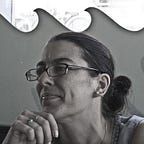On the pressure to produce, and the importance of purpose
It’s a sort of chicken-and-egg problem, really, I suppose: are academics obsessed with producing work or are people obsessed with working drawn to academia? In any case, it is my second summer as contingent faculty and I’ve been thinking a lot about how or if that should shape my relationship to productivity in the summer.
In a traditional academic job, especially tenure-track, obviously publication is important. A small liberal arts school will have different measures than an R-1 (a major research university), but you pretty much have to publish no matter what.
But I’m not especially interested in a tenure-track position. I’ve thought a lot about what it entails on a day-to-day basis — working closely and intensely with a group of colleagues, self-promotion, presenting at conferences, pressures to publish, participation in departmental events and functions — and I don’t really want my work week to look like that. I *like* going to my departments’ events, often, but I like even more that I don’t *have* to.
So it doesn’t really matter if I publish.
And yet, I feel this pressure to publish. Not necessarily in academic venues, but to research and write, and put it out there.
One of my goals for this summer — alongside several writing projects and the usual class prep — is to really think about what I want to produce, and especially *why*. I don’t want to write because it’s comme il faut. That’s writing without purpose, really. I like doing things that have purpose.
So if I choose to write and try to publish, what am I hoping to get from it? Is it valuable enough to counterbalance the fact that I could have spent that time quilting, or finally finishing the Barcarolle, or reading novels, or just watching the finches singing their sublime song at the feeder?
I came across a Toni Morrison quote earlier that reframed all this a bit for me:
There is no time for despair, no place for self-pity, no need for silence, no room for fear. We speak, we write, we do language. That is how civilizations heal.
She was talking about writers and the obligation they have to the world. I have no illusions that my writing is going to change the world; if nothing else, I wilt under the spotlight, so I would make a poor world-changing ambassador. But it helped me think about what kind of writing I might like to give my energy to for the next few months.
One short piece I’m already committed to writing this summer is for the Online Biographical Database of the Women Suffrage Movement in the United States, for whom I’ve already written several biographies. I love this project because it memorializes the work of so many ordinary women. Many of them were white socialite elite types, yes, but, for instance, I also wrote the biography of Dr. Gertrude E. Curtis (not yet published, alas), who was the first Black woman dentist in New York City, who was married to a famous Broadway star, and who was a fierce and tireless fighter for women’s rights and for civil rights.
And who was almost entirely forgotten.
It felt valuable to tell her story. It feels valuable to tell the stories of the generations who fought to make this brutally imperfect world, this world with its annihilating need, a little better for us who follow them. It inspires me to fight as hard as they did, to do the work that Morrison says we are all called on to do for the world.
I am currently playing with the idea of an essay on an early and extremely influential classicist in America who was also a Confederate soldier and subsequently a Lost Cause devotee. I think it matters that we interrogate the people who shaped our fields, and understand why our fields look the way they do. I think it’s important that classicists wrestle with our discipline’s, ah, problematic past, because my field is actively being used to further the agenda of white supremacists, and I want no part of that.
So I don’t know if I want to give a lot of energy to writing and trying to publish scholarship this summer. I feel a bit more drawn to the idea of being of use. Contributing my little expertise on the off chance that it can contribute to healing the world.
